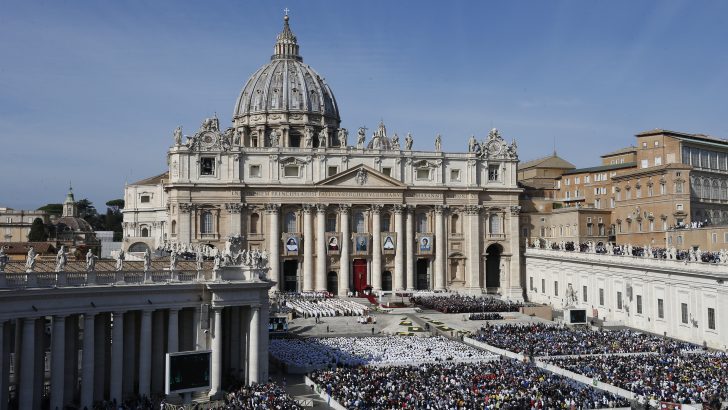Saints are people who recognised their need for God’s help, who took risks to discover God’s will and to help others and who nurtured a habit of thanksgiving, according to Pope Francis.
“The culmination of the journey of faith is to live a life of continual thanksgiving. Let us ask ourselves: Do we, as people of faith, live each day as a burden, or as an act of praise?” the Pope said in his homily on Sunday after formally declaring five new saints for the Church.
Those canonised at the Mass were: St John Henry Newman, the British theologian, poet and cardinal who died in 1890; Brazilian St Maria Rita Lopes Pontes, popularly known as Sister Dulce, who died in 1992; Indian St Mariam Thresia Chiramel Mankidiyan, founder of the Congregation of the Holy Family, who died in 1926; St Marguerite Bays, a Swiss laywoman and mystic, who died in 1879; and St Josephine Vannini, the Italian co-founder of the Daughters of St Camillus, who died in 1911.
“Three of them were religious women,” the Pope noted in his homily. “They show us that the consecrated life is a journey of love at the existential peripheries of the world.”
“St Marguerite Bays, on the other hand, was a seamstress; she speaks to us of the power of simple prayer, enduring patience and silent self-giving,” he said.
Holiness
Rather than describing Newman, Pope Francis quoted from him to illustrate the meaning of the holiness of daily life: “The Christian has a deep, silent, hidden peace, which the world sees not…the Christian is cheerful, easy, kind, gentle, courteous, candid, unassuming; has no pretense…with so little that is unusual or striking in his bearing that he may easily be taken at first sight for an ordinary man.”
And, referencing St John Henry Newman’s famous hymn, ‘Lead, Kindly Light’, the Pope prayed that all Christians would be “kindly lights amid the encircling gloom”.
Tens of thousands of people filled a sunny St Peter’s Square for the canonisation ceremony and Mass. Among them were Britain’s Prince Charles, Italian President Sergio Mattarella, Brazilian Vice President Hamilton Martins Mourao, education minister Joe McHugh, a member of Switzerland’s federal council and the deputy foreign minister of India.
Melissa Villalobos from Chicago also was there with her husband and children, and they brought up the offertory gifts at the Mass. Mrs Villalobos’ healing, which saved her life and the life of her unborn child, was accepted as the miracle needed for Newman’s canonisation.
The depth of this man of God and the place he now occupies in Catholicity make us aware of the void his absence would have left if he had not been”
An official delegation of Anglican bishops and priests also attended the Mass, and Archbishop Justin Welby of Canterbury, leader of the Church of England, recorded a message for the occasion.
“His legacy is far broader than one Church or two Churches,” the archbishop said. “It is a global legacy, a legacy of hope and truth, of the search for God, of devotion to being part of the people of God.”
St John Henry’s role in founding the Oxford Movement in the Church of England, a push to rediscover the early Christian writers and to recover the Catholic roots of Anglicanism, “had a fundamental, lasting, beneficial and important influence on Anglicanism,” Archbishop Welby said.
For his part, the Prince of Wales insisted that people should emulate Newman’s approach to life.
His example, Prince Charles insisted, “is needed more than ever for the manner in which, at his best, he could advocate without accusation, could disagree without disrespect and, perhaps most of all, could see differences as places of encounter rather than exclusion”.
Conference
It came as a Vatican conference heard calls for Newman to be declared as a ‘Doctor of the Church’.
Christians should not be afraid of differences, Prince Charles said, after all, “harmony requires difference. The concept rests at the very heart of Christian theology in the concept of the Trinity”.
“As such,” he said, “difference is not to be feared. Newman not only proved this in his theology and illustrated it in his poetry, but he also demonstrated it in his life. Under his leadership, Catholics became fully part of the wider society, which itself, thereby, became all the richer as a community of communities.”
The Prince of Wales insisted that people should emulate Newman’s approach to life”
Meanwhile, Canadian Cardinal Marc Ouellet – tipped by many as a potential future Pope – said he believed that St John Henry should be hounoured with the title ‘Doctor of the Church’.
Currently about three dozen saints, including four women, hold the title in recognition of their contributions to theology and spirituality. They include such luminaries as John Chrysostom, Augustine, Thomas Aquinas, Bonaventure, Catherine of Siena and Therese of Lisieux.
“The depth of this man of God and the place he now occupies in Catholicity make us aware of the void his absence would have left if he had not been,” Cardinal Ouellet said.
Advocating for recognition of Newman as a doctor of the Church, the cardinal particularly pointed to the new saint’s teaching that “in order to keep its integrality, the faith of the Church must adapt its language to the cultural challenges and the dangers of heresy.”
Newman’s teaching on the development of doctrine held that “although the deposit (of faith) does not change, the Church’s knowledge of it progresses, deepens and is expressed in a new way, always faithful to the original idea,” the cardinal said.
Cardinal Ouellet also spoke about how Newman influenced theologians involved in the Second Vatican Council (1962-65).
Fr Ian Ker, author of more than 20 books about Newman, said that “what’s especially important for me is this (canonisation) enables him to be made a doctor of the church, because I believe he is the doctor par excellence of the post-conciliar period like St Robert Bellarmine is of the Tridentine period”.



